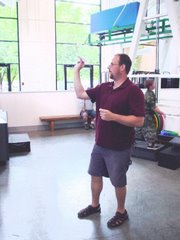I had my students read the Paradox of Choice by Barry Schwartz this semester. The thesis is that too many choices makes people less happy, not more so (take that! Hegemony of consumer capitalism!). In the midst of revising my dissertation, I feel a similar paradox entangling me.
Lets call it the paradox of technology. The more technological options there are too facilitate writing and thinking, the more muddled the thinking becomes. Points to consider:
- I have a big Word file with the putative text of the dissertation (“the beast” or “the big, hairy, ugly beast” I call it).
- With Word, I can highlight and insert comments.
- I started a second file called revision plan where I put comments from the committee and my responses. It also had some random notes of mine about process. I started a big to do list as a table. Like this:
| Task | Ideas |
| - Write Intro | - Read “classics” of brokers |
| - Summary overview of 4 companies | -Do more domain expert surveys. |
| | |
Tabling lists has worked well for me with syllabi and other tasks.
- Meanwhile, as I read the beast (in some ways for the first time since I never really read through the beast from A to Z), I am putting little notes to myself in comments. Things like “Move this to intro.” Or “Check Billy Bob Jones 2003.” Or “These results need to be checked. Why include gender when its not significant?” On one hand, this helps me to get through a reading without getting distracted by every little thing I notice or think about. It reduces anxiety because I don’t sit there going “I Damn well better remember that!” On the other hand, it is comments crack- highly addictive and provides the illusion of comfort. Instead of actually revising, I just stick a comment in and the whole beast starts growing more heads than a hydra on steroids.
- I started to do a reverse outline of the beast in a now THIRD Word file. I dropped as I moved into the mind mapping \(see below).
- Word, Word everywhere: There are also older pre-writing and parallel writing files that live on the hard drive that cover topics like methodology, theory, my process, and research questions. There are also about thirty files of reading notes. I worry sometimes that good ideas, good text, or important connections are languishing amongst these, but I tend to avoid looking at them as it feel like a procrastination technique.
- Last winter, I stumbled across the use of mind maps (Example). I thought they looked cool because I tend to be a very visual thinker. I stopped myself from exploring too much as I smelled another procrastination trap. Now, in this revision, I let myself play with OpenMind for about 15minutes and the ability to visually map out levels and ideas seems to be working pretty well. As I read the beast, I am mapping the outline as it should be and making note of what is already in the beast and what needs to be added or moved. The mind map overlaps somewhat with the revision plan, the comments, and the reverse plan. I can imagine finishing the mapping, printing the map as an outline, and then using that outline as the template for the big time revising where I go through the beast and make all the pastes, cuts, and redrafts needed on the way to the final version.
- As I re-examine some of my analysis, I find myself needing or wanting to double check some quantitative results. This leads me to variably open network software (UCINET), or Stats software (Excel and SPSS). In some cases, is imply put a comment in saying “(check results.” In other cases, I run a new analysis and included the revised results. For example, in Chapter 2, I had written about included results that had non-significant variables and I pasted a different regression model with only significant results.
Three issues that emerge from this account:
1) I worry about overlap or inefficiencies in having basically three repositories of pre-writing or goals: the revision plan, the comments pegged to the beast, and the mind map. Also, switching between 3-10 word files, two stats programs, UCINET, citation software (RefWorks) and possibly some net visualization software ends up providng a world of side tracks, cul-de-sacs, loops, ambles, and long pauses in my writing/thinking. (Ask me about p-ness sometime :<))
Put another way- should I divide and conquer revising using separate files or should I stick to the beast and use the main Word file as the only revising “space” (in other words only work with that file and fix it as needed)?
2) Am I making life more difficult for myself by ignoring various files of pre- and parallel writing or by not opening and using those files?
3) Am I combing too many layers of revising? Should I simply read for concepts and re-organizing and then go back and fix tables, redo analyses and such? Or, is my multi-level revising better since it will allow me to look at actual analyses and see what results I have or need and have that feed into drafting or revising of theoretical and let review sections?
